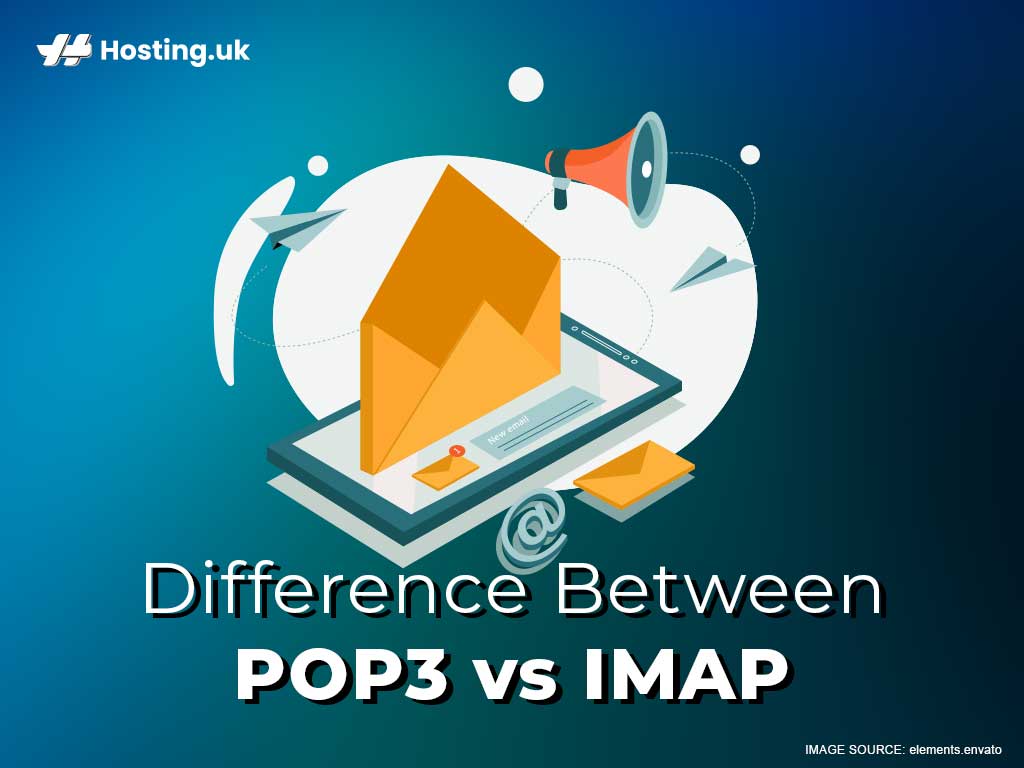If you’ve finally got around to setting up your email with cPanel, you’ve probably been seeing the terms “POP3” and “IMAP” a bit too often for your liking. POP3 and IMAP are two of the most popular email protocols, but they’re very different. In this guide, you’ll learn seven important differences between POP3 and IMAP. As a bonus, we’ll also tell you how POP3 and IMAP compare to hosted exchange, so you know exactly what you’re paying for!
Let’s get into it.
Table of Contents
What is POP3?
POP stands for Post Office Protocol, which is a type of email protocol. It’s called POP “3” because POP3 is the third version of this protocol. Post Office Protocol is so named because it acts exactly like a post office.
We’ll explain.
When you use POP3 as your email protocol, your emails are held until you download them. (Just like when a letter gets sent to a post office, it stays there until you collect it.) When you download an email from the POP3 server, the email is automatically deleted from POP3, in the same way that when you collect your letter from the post office, the post office no longer has it.
What is IMAP?
IMAP stands for Internet Messaging Access Protocol. It’s an email protocol that was designed to allow access to your email from many different devices. That’s because it stores your email data on a server, instead of storing it on your device. When you access your emails using IMAP, the server lets you access your emails and download them for viewing on the internet. As long as you don’t delete your emails, they’re stored on the server even after you download them onto your device.
This means that any changes you make to your email client will still be there when you access your email from another device.
Here are the main differences between POP3 vs IMAP:
7 Differences between POP3 vs IMAP
1. Email deleted vs. stored on server
When you use POP3 vs IMAP, your emails are automatically deleted once you download them onto your device. When you use IMAP, however, your emails remain on the server even after being downloaded.
2. Sync DATA to multiple devices
IMAP syncs data across multiple devices, but POP3 does not. This means that when you use IMAP, any device that also accesses the server client using IMAP will be able to see the most recent version of your inbox.
3. Download emails vs. preview
When you use POP3 vs IMAP, you have to download the email if you want to read it. With IMAP, on the other hand, you can preview the content before downloading it.
4. Configure email on server
You can’t use POP3 to create, rename, or delete any of the mailboxes on your server. With IMAP, you can create, rename, and delete any mailbox on your server.
5. Organise emails
You can’t organise the emails on your POP3 email server, but if you use IMAP, you can organise your emails to your heart’s content.
6. Partial Downloads
POP3 doesn’t allow partial download. If you want to view the email, you have to download the entire email. This is terrible in situations where you have limited bandwidth. But if you use IMAP, you are allowed partial downloads.
7. Email search capacity
With POP3, you can’t search for the content you want before you download it, but IMAP has a handy Search function that lets you search within your emails for a specific string of characters before downloading.
POP3 vs IMAP vs hosted exchange
We’re finally at the hard part: comparing POP3 vs IMAP vs hosted exchange. The good news is that if you’re grappling with these questions, it means you’re definitely interested in an email client, which means you probably have some idea why email clients are so much better than webmail, especially for email marketing purposes.
The developers of IMAP had their hearts in the right place: People needed to be able to check their email from any computer, anywhere in the world. But hosted exchange takes this idea and elevates it.
Hosted exchange is a hosted version of Microsoft Exchange, which is a computer server that stores everything you need to stay on top of your tasks and communications. This includes your calendar, to-do lists, and messages. When you use hosted exchange, you always have access to these, regardless of which device you’re using. And get this – with hosted exchange, you can even access them when you’re offline.
This beats POP3 and IMAP by a mile!
Here are some benefits you get when you choose hosted exchange:
1. Secure access to your emails
2. Synced access to your emails across multiple computers
3. Automatic out-of-office notifications
4. Cutting-edge spam filtering
5. Synced calendar, tasks, and to-do lists
6. Constant access to communications
And, most importantly, all the features of hosted exchange are always being backed up, which means that even if your device crashes, or gets lost or stolen, all the data you store in Outlook will be perfectly safe.
Wrapping up
IMAP is a long-awaited, much-improved alternative to POP3, because IMAP lets you access your emails from multiple devices. But if you really want to take your emails to the next level, what you want is hosted exchange!
New to Roundcude? If you found this guide helpful, you’ll love our guide on how to access your Roundcude email.
